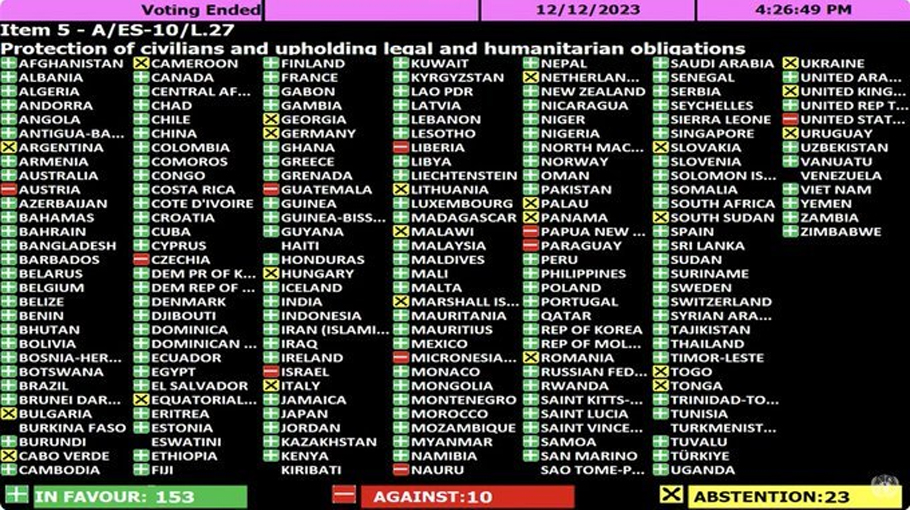What Next After the General Assembly Vote?

The UN General Assembly has now voted on the resolution calling for an immediate ceasefire in the Israel/Gaza conflict which the United States vetoed in the Security Council.
Joining Israel and the United States in voting “no” were Austria, Czech Republic, Guatemala, Liberia, Micronesia, Nauru, Papua New Guinea and Paraguay.
The 23 abstainers were Argentina, Bulgaria, Cameroon, Cape Verde, Equatorial Guinea, Georgia, Germany, Hungary, Italy, Lithuania, Malawi, Marshall Islands, Netherlands, Palau, Panama, Romania, Slovakia, South Sudan, Togo, Tonga, Ukraine, United Kingdom and Uruguay.
It is noteworthy that only two European countries voted with Israel and the United States and that only eight members of the European Union abstained, which suggests that the unconditional support for Israel’s “right to defend itself” manifested in Europe until recently is starting to melt away. Indeed, even Ukraine abstained.
Also noteworthy is that no country in Asia other than Israel itself either voted “no” or abstained on this resolution, which suggests that the U.S. government’s hopes of enlisting loyal Asian support for confronting, containing and countering its perceived primary adversary, China, will not be easily achieved.
Even the Marshall Islands and Palau, two of the three (with Micronesia) “Freely Associated States” of the United States, quasi-colonies with U.S. Zip/postal codes, bound by their Compacts of Free Association to be guided by the United States in their foreign policies and usually faithful camp followers in filling out the minimal numbers of anti-Palestine votes on UN resolutions, dared to abstain in this vote. Even for them, some bridges of moral bankruptcy, inhumanity and depravity in American foreign policy are too far to cross.
This vote was held at an “emergency special session” of the General Assembly under the “Uniting for Peace” resolution, applicable when the Security Council fails to exercise its primary responsibility for international peace and security due to the veto of a permanent member, and there is precedent for such votes being deemed, like Security Council votes, legally binding (https://legal.un.org/avl/ha/ufp/ufp.html).
Of course, that fine legal distinction may be viewed as irrelevant, since Israel has rarely if ever complied with any UN resolution that it did not like, whether “binding” or not, and since Israel’s effective control of the U.S. government has ensured that its defiance has not given rise to any adverse consequences.
However, there is one respect in which the potential binding nature of such a “Uniting for Peace” resolution could become relevant.
If the State of Palestine were to follow up on this overwhelming General Assembly vote by applying to the Security Council for a status upgrade from non-member observer state to full member state and if the United States were to veto that application, could the same issue be brought to the General Assembly under the “Uniting for Peace” resolution, with the result of that vote being treated by the UN secretariat, guided by a Secretary-General who is clearly not suffering Israeli defiance, extaordinary public rudeness and personal insults gladly, as binding?
American international law professor Francis Boyle thinks that this could and should be possible.
There is reason to hope that, if President Biden were to be tested in the days immediately ahead, Professor Boyle’s legal theory might not need to be.
Even while airlifting massive amounts of weapons to Israel and providing diplomatic cover for it, the U.S. government has been publicly insisting, with a level of sincerity that has yet to be tested, that a “two-state solution” is now essential for peace and security in the Middle East.
In light of this public stance and in the wake of its having disgusted most of mankind with its latest Security Council veto, would the U.S. government really dare to disgust most of mankind again with a second anti-Palestinian veto in rapid succession, one which would simultaneously lay bare the cynical insincerity of its purported support for Palestinian statehood, which is already recognized diplomatically by the UN, by 138 UN member states and by the Holy See/Vatican City? Exceptionally, right now, it might not.
If there is anything left of international law and the UN system, the occupation of the entire territory of a UN member state by another UN member state, as in the case of Kuwait for seven months, cannot be permitted to persist indefinitely and without consequences.
With global sympathy and support for Palestine and its people at an all-time high, Palestine has nothing to lose — and potentially a great deal to gain — from putting the United States to the test.
John V. Whitbeck is a Paris-based international lawyer.
CounterPunch


